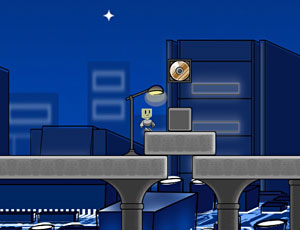The San Jose Public Library was recently awarded a $35,000 grant from the Knight Foundation to develop an online project to help people understand privacy issues in the digital age. After recruiting student programmers from the SJSU Game Development Club and researchers from the International Computer Science Institute in Berkeley, the library came up with a working prototype. The library will present the prototype at the American Library Association annual coNference in San Francisco this weekend, as well as the Digital Rights in Libraries conference a few days. The latter event emerges thanks to the Library Freedom Project.
In general, online privacy is a complicated stew of issues that still befuddles quite a few people. The San Jose Public Library’s test prototype, a video game of sorts, will teach people how to make informed decisions about their online activity. Believe it or not, many people still don’t understand basic components of how the online world works, that is, who can see our activities, just which institutions are spying on our habits and selling them to advertisers, or just how social media environments like Facebook handle these things.
So what’s the answer? A whimsical video game that takes users through a Donkey Kong-style environment where the user travels through different levels, bounces around to answer questions and collect discs on his or her path toward privacy education. In the process, the user learns more about social media and the online world.
And it’s not just for kids. If you’re confused about all of this stuff like sharing, permissions or checking in to a tire shop on Swarm, well, you just might learn a few things. That’s the idea.
“Security, privacy—it’s a scary topic for a lot of people,” said Erin Berman, the librarian in charge of the project. “So what I wanted to do was create a way to make it fun. Take this dry and scary topic and make it fun and engaging. And also recognize that people have different needs.”
As a result, several different issues came up during the course of the project. With over three billion people now using the internet on many different levels, privacy means different things to different people.
“One of the things that popped up for me is that privacy is an outdated concept,” Berman said. “Everybody has a different definition of privacy now. And that what you do online might be different than what I do online, and that we might share differently, but one of the most important parts is just to have that base education.”
For example, in order to feel safe and confident online, users need to know how to do that. This could mean something different for any given person. For example, these days, some generations fall victim to phony telephone tech support scams, or they don’t even realize their web browsing activities might be tracked by a remote machine somewhere. In other cases, people share all the wrong twerking videos on Facebook, which can come back to haunt them in future job interviews. Small businesses, to cite another instance, often fail to understand just how their customers’ information stays safe.
If everyone just became aware of these issues, the world might be a better place. And what better institution than your local library to begin the journey? With libraries evolving more and more into multidisciplinary educational centers in general, places where one can go look for real, living, trustworthy people to explain all of this, such a project makes sense. It shows that libraries are not stagnating. They continue to forge new paths into the future. This is just one example.
“Libraries have always been centers for literacy, places to learn new things,” Berman said. “And this is just another type of literacy, just like a lot of libraries are transitioning into teaching people how to use 3D printers or how to solder, or how to code. Those are all different types of literacy. They’re all different skills to up your life game. And we want to address concerns and current relevant issues that are happening. And this is an important topic to discuss.”




